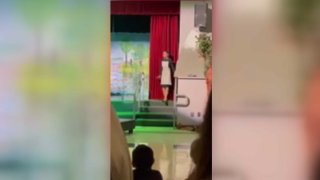
The decision to eliminate Nazi symbolism from a Fullerton elementary school’s rendition of “The Sound of Music” is drawing both support and opposition.
Some parents are outraged that some parts of the Academy Award-winning play have been removed from Rolling Hills Elementary School’s performance because of the Nazi storyline. Others believe that some of the content is too serious for young children to fully understand.
“The Sound of Music” is based on the real-life Von Trapp family during the rise of Nazi Germany, and their escape from it.
Lisa Lobito’s daughter is playing the lead role of Maria at Rolling Hills Elementary School’s performance. Lobito said the play originally included scenes with the Nazi storyline, including images of swastikas, but those have now been removed by school administrators.
Get top local stories in Southern California delivered to you every morning. >Sign up for NBC LA's News Headlines newsletter.
"This year they have removed a lot of scenes. They've tried to remove any content with the fascist regime,” she said.
The edits were made at the behest of Fullerton School District Superintendent Bob Pletka.
“Two weeks ago, I learned that Rolling Hills intended to incorporate swastikas as props and have 11 and 12-year-old students perform the ‘Heil Hitler’ salute in their upcoming play. I felt responsible to take action,” he said in a statement to NBC4.
Local
Not only are those symbols associated with the genocide of 6 million Jews, but there was a risk that the child performers could be unwittingly associated with those Nazi symbols, Petka said.
He said that in the age of social media, there is a risk well-meaning parents and community members could share the images, leading to the kids being “vulnerable to the co-opting of these photographs by nefarious individuals or groups meant to mock or exploit our children for their own purpose.”
He noted that the district has in the recent past experienced the consequences of social media posts leading to threatening messages to children, parents and staff.
“I made the decision to remove these signs and symbols associated with genocide from the play. By doing so, I aim to protect our children from the potential harm that could arise from their unknowing association with such destructive and harmful imagery. It is my responsibility and the responsibility of our whole staff to remain vigilant in fostering an environment that is safe, inclusive, and respectful for all members of our community,” Petka continued.
During a school board meeting last week, some parents voiced their concerns about the Nazi subject matter, including a mother who has an 8-year-old son.
"When my wife called me, she said our son was whispering, ‘Little Nazi boy, little Nazi boy.’ I'm like, ‘What? Where is that coming from?’ It came from school,” she said.
However, some say the edits are an example of hiding history.
"The kids in our sixth grade, they go to the Museum of Tolerance. They have a Holocaust survivor come talk to their classroom. They have spent months learning about World War II, Holocaust, all those things, and this play is the culmination of the history that they've learned,” fellow parent Sarah Blake said.
But Anti-Defamation League Regional Director Peter Levi says that, while his group does not support censorship – particularly books bans at schools and libraries – he understands the school district concerns because of the young age of the students.
"It's really difficult for younger children that haven’t developed psychologically in order to really appreciate the deeper context, let alone the sheer horror, of the Holocaust, Levi said.
Still, some parents are worried that removing certain parts of history could be setting a bad precedent.
"If this is how we as a community are going to deal with content that we are uncomfortable with, what's next?” Lobito queried.



